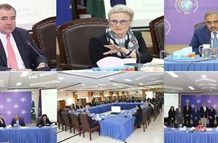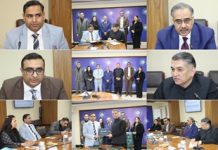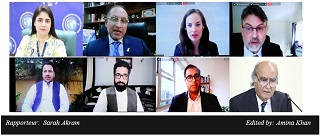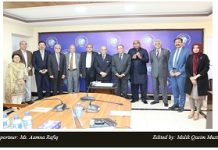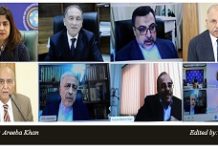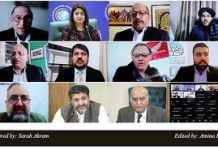The Centre for Afghanistan, Middle East & Africa (CAMEA) at the Institute of Strategic Studies Islamabad (ISSI) had a Panel Discussion on ‘Conversations on the Evolving Situation in Afghanistan: US Role in Afghanistan’ which is the seventh in a series of conversations CAMEA is having on Afghanistan – under its ‘Conversations on the Evolving situation in Afghanistan’.
The distinguished speakers included: Director General ISSI, Ambassador Aizaz Ahmad Chaudhry, Dr. Elizabeth Threlkeld, Senior Fellow and Deputy Director of the South Asia Program at the Stimson Center, Dr. Anatol Lieven, Senior Research Fellow on Russia and Europe at the Quincy Institute for Responsible Statecraft, Mr. Shehzad Qazi, a public opinion researcher based in the United States, Mr. Faiz Zaland, Professor in Kabul University, Mr. Tameem Bahiss, Analyst specializing Afghan and Pakistani affairs and Ambassador Khalid Mahmood, Chairman Board of Governors ISSI also participated in the discussion.
During her opening remarks, Ms. Amina Khan, Director CAMEA said the situation in Afghanistan has drastically changed, with the Taliban takeover of the country, followed by the complete withdrawal of US forces. The US departure has left many questions unanswered, where its implications are yet to be fully felt in the region and beyond. Although the Taliban appear to have achieved their goal of expelling foreign forces, however, the real test for the Taliban has only just begun, which is certainly not limited to the capture of power, but it is more about legitimacy, recognition, acceptance, and performance. Even within the confines of the current Taliban dominated setup, recognition for the government now may not depend on inclusion, but whether they can deliver in terms of governance, foreign relations, human rights and more importantly CT assurances. Domestically, a lot will depend on how the group formulates its policies towards Afghan institutions like the army, police, bureaucracy etc. While we are all aware of the role the US has played in Afghanistan over the past two decades, the current policy appears to be determined by recognition of the group as the de facto government of Afghanistan, as stated by Secretary Blinken. While it remains to be seen how the relationship will evolve, it is necessary for Washington to remain engaged with the group.





